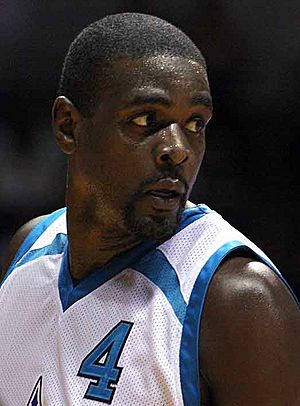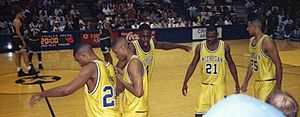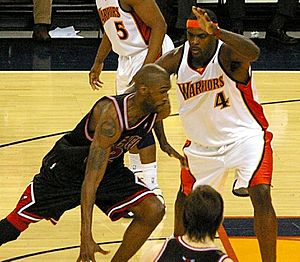Chris Webber facts for kids

Webber in 2010
|
|
| Personal information | |
|---|---|
| Born | March 1, 1973 Detroit, Michigan, U.S. |
| High school | Detroit Country Day (Beverly Hills, Michigan) |
| Listed height | 6 ft 10 in (2.08 m) |
| Listed weight | 245 lb (111 kg) |
| Career information | |
| College | Michigan (1991–1993) |
| NBA Draft | 1993 / Round: 1 / Pick: 1st overall |
| Selected by the Orlando Magic | |
| Pro career | 1993–2008 |
| Career history | |
| 1993–1994 | Golden State Warriors |
| 1994–1998 | Washington Bullets / Wizards |
| 1998–2005 | Sacramento Kings |
| 2005–2007 | Philadelphia 76ers |
| 2007 | Detroit Pistons |
| 2008 | Golden State Warriors |
| Career highlights and awards | |
|
|
| Career NBA statistics | |
| Points | 17,182 (20.7 ppg) |
| Rebounds | 8,124 (9.8 rpg) |
| Assists | 3,526 (4.2 apg) |
Mayce Edward Christopher Webber III (born March 1, 1973), also known as "C-Webb", is an American former professional basketball player. He played for 15 seasons in the National Basketball Association (NBA). He is best known for his time with the Sacramento Kings.
Webber was the first player chosen in the 1993 NBA draft. During his career, he was a five-time NBA All-Star and the NBA Rookie of the Year. He also played for the Golden State Warriors, Washington Bullets/Wizards, Philadelphia 76ers, and Detroit Pistons.
In college, Webber was a star player for the Michigan Wolverines. He was part of a famous group of freshmen called the "Fab Five." They led their team to the NCAA championship games in 1992 and 1993. Later, Webber was involved in a scandal because he accepted money from a team supporter, which is against college sports rules. As a result, the NCAA took away his college awards.
After retiring from basketball, Webber became a TV commentator for NBA games. He has also taught classes at Wake Forest University and Morehouse College. In 2021, he was inducted into the Naismith Basketball Hall of Fame.
Contents
High school career
Webber went to Detroit Country Day School from 1987 to 1991. He was one of the most sought-after high school basketball players in Michigan since Magic Johnson. Webber led his school to three state championships.
As a senior, he averaged 29.4 points and 13 rebounds per game. He was named Mr. Basketball of Michigan and the National High School Player of the Year. He was also the MVP in the McDonald's All-American Game.
College career
Webber attended the University of Michigan for two years. He was the leader of a group of freshmen known as the Fab Five. The group included Webber, Juwan Howard, Jalen Rose, Jimmy King, and Ray Jackson.
The Fab Five became very popular. They brought a new style to college basketball with their long, baggy shorts and black socks. They led Michigan to the NCAA championship game in both of their years at the school, but lost both times.
The famous timeout
In the 1993 NCAA championship game against North Carolina, Michigan was losing 73–71 with only 11 seconds left. Webber had the ball and tried to call a timeout. However, his team had no timeouts left.
This mistake resulted in a technical foul, which gave North Carolina free throws and the ball. This sealed the victory for North Carolina. The moment became a famous and often-joked-about part of Webber's career.
College rule violations
Webber's college awards were later taken away by the NCAA. This happened because it was discovered that he had accepted over $200,000 from a team booster while playing for Michigan. College athletes are not allowed to be paid.
Because of this, Michigan had to forfeit its wins from that time, including its appearance in the 1992 Final Four. The school also had to take down the championship banners from its arena. Webber was banned from having any connection with the Michigan basketball program until 2013.
In 2018, after the ban ended, Webber returned to the University of Michigan as an honorary captain for a football game. He was warmly welcomed by the fans.
Professional career
Golden State Warriors (1993–1994)
Webber was the first player chosen in the 1993 NBA draft by the Orlando Magic. They immediately traded him to the Golden State Warriors for another player, Penny Hardaway, and three future draft picks.
In his first year, Webber played great, averaging 17.5 points and 9.1 rebounds per game. He won the NBA Rookie of the Year Award. However, he did not get along with his coach, Don Nelson. Because of their disagreements, Webber chose to leave the team after only one season. The Warriors traded him to the Washington Bullets.
Washington Bullets / Wizards (1994–1998)
In Washington, Webber was reunited with his college teammate, Juwan Howard. He continued to be a star player. In the 1996–97 season, he was chosen for his first All-Star team.
He led the Bullets (who were renamed the Wizards in 1997) to the playoffs for the first time in nine years. By 1998, Webber was known as one of the best power forwards in the league.
Sacramento Kings (1998–2005)
In 1998, Webber was traded to the Sacramento Kings. At first, he did not want to go to Sacramento because the team had a history of losing. However, his time with the Kings would become the best part of his career.
The Kings built a strong team around Webber, with players like Peja Stojaković, Vlade Divac, and Jason Williams. In his first season, Webber led the league in rebounding with 13.0 rebounds per game.
The Kings became one of the best teams in the NBA and were contenders for the championship. Webber was an All-Star every year from 2000 to 2003. His best season was in 2000–01, when he averaged 27.1 points and 11.1 rebounds per game.
2002 Western Conference Finals
In the 2001–02 season, the Kings had the best record in the NBA and reached the Western Conference Finals. They played against their rivals, the Los Angeles Lakers, who were led by Kobe Bryant and Shaquille O'Neal.
The series was very close and went to a deciding Game 7. It was a very controversial series with some questionable calls by the referees, especially in Game 6. The Kings lost Game 7 in overtime, and it was the closest Webber ever got to an NBA championship.
Knee injury
During the 2003 playoffs, Webber suffered a serious knee injury that required surgery. He missed almost a full year of basketball. After he returned, he was still a good player, but he had lost some of his quickness. The Kings were never quite the same championship-contending team after his injury.
Philadelphia 76ers (2005–2007)
In 2005, Webber was traded to the Philadelphia 76ers, where he played alongside star guard Allen Iverson. He had a solid season in 2005–06, averaging over 20 points per game.
However, by the next season, his role on the team was smaller. In January 2007, the 76ers and Webber agreed to end his contract, and he became a free agent.
Detroit Pistons (2007)
Webber then signed with the Detroit Pistons, his hometown team. He had always wanted to play for the Pistons. He wore number 84 because his usual number 4 was retired for Joe Dumars.
The Pistons made it to the Eastern Conference Finals but lost to the Cleveland Cavaliers. This was another missed chance for Webber to reach the NBA Finals.
Return to Golden State and retirement (2008)
In January 2008, Webber signed with the Golden State Warriors for one last run. He played in only nine games before ongoing problems with his surgically repaired knee forced him to retire from basketball in March 2008.
On February 6, 2009, the Sacramento Kings honored Webber by retiring his #4 jersey.
Life after basketball
After retiring, Webber became a TV analyst for NBA games, working for NBA TV and TNT. He was part of the Inside the NBA crew for many years.
He has also been involved in many other projects. He produced music for the rapper Nas and acted in the movie Uncle Drew. In 2016, he became a professor at Wake Forest University, teaching a class on sports storytelling.
Webber is also a collector of African-American artifacts. His collection includes historical documents signed by figures like Frederick Douglass and Martin Luther King Jr.. He has displayed his collection in museums to help educate children.
Charity work
Webber has been active in charity since 1993, when he started The Timeout Foundation. The foundation helps provide educational and fun activities for young people.
While playing for the Kings, he created "C-Webb's Crew." This program gave tickets to at-risk youth and their families so they could attend Kings games. He has won several awards for his community service.
See also
 In Spanish: Chris Webber para niños
In Spanish: Chris Webber para niños
 | Tommie Smith |
 | Simone Manuel |
 | Shani Davis |
 | Simone Biles |
 | Alice Coachman |



